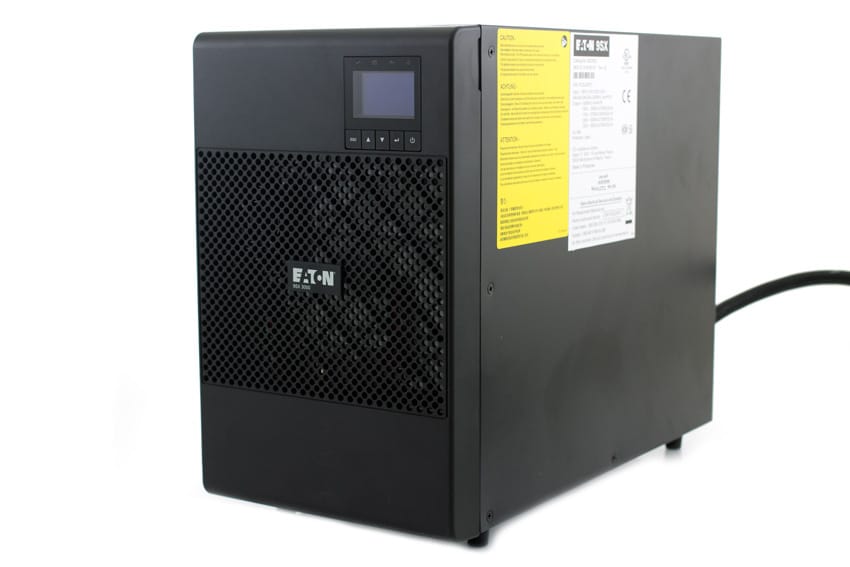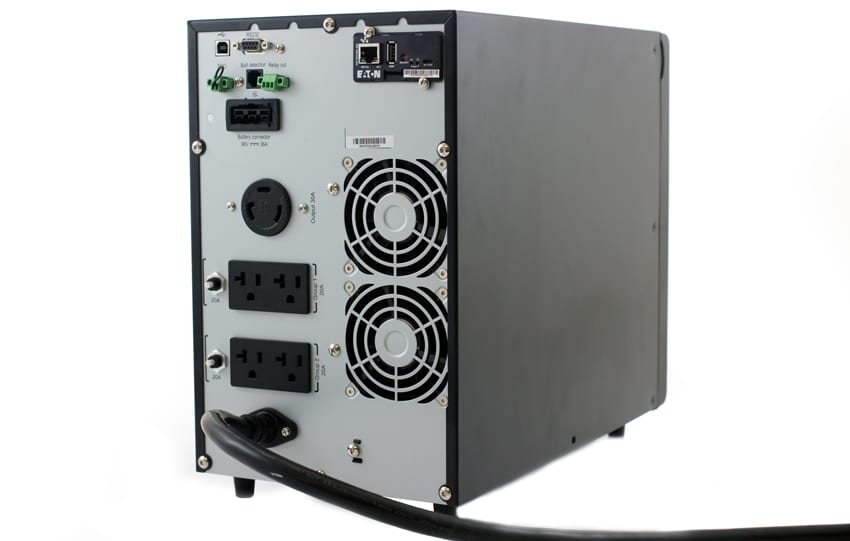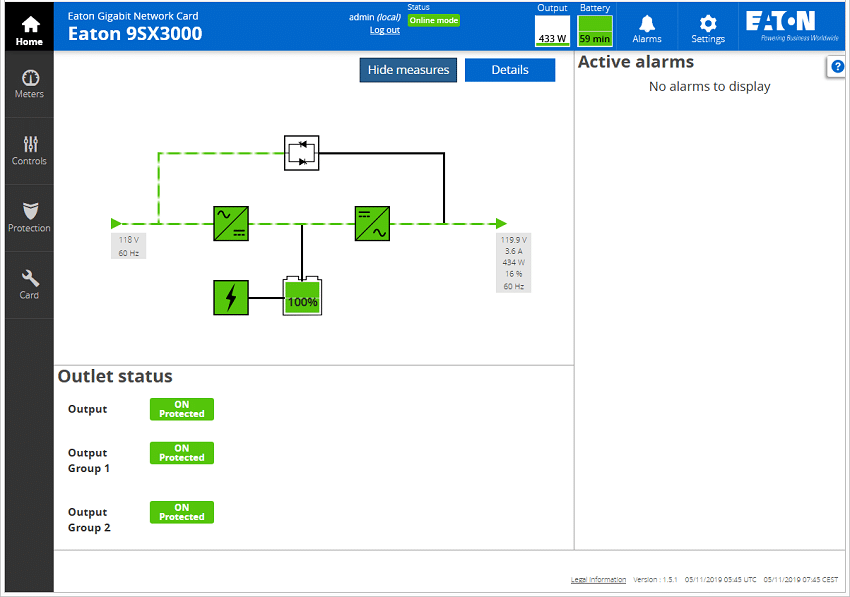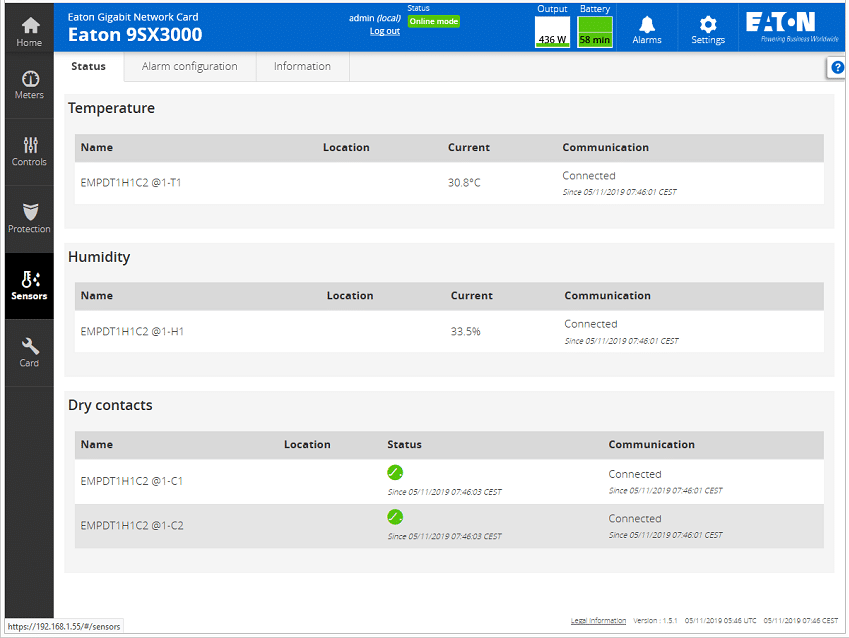
The Eaton 9SX3000 is the largest model of the company’s 9SX UPS line. The 9SX UPS solutions are highlighted by their topology, internal static bypass and intuitive, slick-looking LCD menu display, as well as network, Modbus, Relay and signal input functionality for easy integration into IoT and Industrial IoT (IIoT) applications. UPS solutions are a vital part of any organization that depends on electronic equipment, as they protect them from unexpected power-related issues that might arise. This includes power failures, sags and surges, brownouts, voltage spikes, frequency variations, and harmonic distortion. Eaton’s 9SX UPS line goes the extra mile with features like double-conversion, online power protection, which is ideal for medical, light industrial, automation and mission critical IT environments.
As far as its build goes, the 9SX UPS series is a little different when compared to the 9PX. The 9SX series uses a unique, tower-only form-factor built for free-standing applications with 700 VA -3 kVA options, whereas the 9PX uses a “convertible” rack/tower form-factor (i.e., narrow when free-standing, like a book on edge, or 2 and 4-post rack mounting options) with standard 4-post rack mounting rails and tower stands with 700 VA -11 kVA options.
Other than that, however, the feature set of both 9PX and 9SX are essentially identical, with only slight variation on the dry contact interfaces. For example, both units are double-conversion, both support extended runtime with EBMs, network cards, and both have standard relay/dry contact provisions for some communication with industrial IoT and other devices that aren’t on a network.
Power output and power efficiency is a big focus of the 9SX3000. It uses the company’s ABM technology, which opens up a range of useful benefits including an increase in battery service life by a whopping 50 percent via a three-stage charging technique. Eaton says that this technology also optimizes recharge time compared to traditional “trickle charging” (the process of charging a fully charged battery at the same rate of its self-discharge rate) and gives users advanced notice before batteries fail. Eaton also claims that the 9SX models provide 28% more wattage than traditional UPSs, allowing users to connect more devices as their needs grow.
Because it uses switchable, programmable outlets, businesses can automate power delivery with the 9SX3000 without a third-party device or PDU. Its programmable signal input (via the RPO port) further increases flexibility, as it enables the UPS to reactively change operating modes based on external events. Moreover, like all models from the 9SX line, the 9SX3000 features remote power off/on off signal input helps to preserve battery life during process shutdown.
Warranty and support-wise, Eaton has you covered. The company provides 24/7 product support and includes some pretty good peace of mind like full battery and UPS replacement plans.
Eaton 9SX3000 Specifications
| Power rating (VA/watts) | 3000/2700 |
| Input connection | L5-30P |
| Output receptacles | (1) L5-30R, (4) 5-20R |
| Dimensions (HxWxD, in.) | 13.6 x 8.4 x 16.2 |
| Weight (lb.) | 77.2 |
| Topology | Double-conversion, online |
| Configuration | Tower |
| Color | Black and silver |
| Diagnostics | Full system self-test at power up, ABM battery test every 30 days |
| Warranty | 2 years electronics and battery |
| Contents |
|
| Nominal voltage | 120V default (100/110/120/125V) |
| Input voltage range | Full load: 100-138V, <25% load: 60-144V |
| Frequency | 50/60 Hz |
| Input power factor | >.99 |
| Input current distortion | <8% |
| Power ratings | 120/125V: 3000VA / 2700W 110V: 2700VA / 2430W 100V: 2400VA / 2160W |
| Circuit breaker | 2000VA: None 3000VA: (3) 20A for (2) 5-20R each |
| Nominal voltage | 120V default (100/110/120/125V) |
| Output voltage regulation, steady state | ±2% normal mode |
| Output Voltage THD (online) | Linear: <3% |
| Power factor | 0.9 |
| Efficiency (online mode with resistive load) | 89% |
| Transfer time | 0ms |
| Optional extended battery module (EBM) | 9SXEBM96 |
| Maximum number of EBMs | Add up to 4 EBMs |
| Battery description | Sealed, lead-acid; maintenance free |
| Battery management | ABM technology; 3-stage charging extends battery service life up to 50% and provides advance warning for battery replacement |
| Battery replacement | Hot-swappable internal batteries and EBMs |
| Start on battery | Cold-start enabled; first cold start is always forbidden |
| Communications | |
| User interface | Graphical display. UPS status in a single view |
| LEDs | 4 status-indicating LEDs |
| Communication ports | RS-232 (RJ45) ports; USB port as standard (HID). 6-foot RS-232 and USB cables included |
| Communications card | Mini-Slot Expansion port. Optional cards:
|
| Power management software | Integrates with Eaton Intelligent Power Manager software |
| Environmental & standards | |
| Operating temperature | 0 to 40 °C (32 to 104 °F) in Online mode, with linear derating for altitude |
| Storage temperature | 0 to 35°C (32°F to 95°F); without batteries: -25 to 55°C (-13°F to 131°F) |
| Relative humidity | 0 to 96% non-condensing |
Design and build
The 9SX3000 is a hefty device as it weighs in at a shade under 74lbs and is over a foot tall. This tower form-factor UPS will sit solidly with its rubber feet in any utility room or point of service.
The 9SX3000 also sports a modern-looking black enclosure, which features a large ventilation grill on the front panel. Just above the grill (and to the right) is Eaton’s advanced five-button graphical LCD. This gives quick and easy access to UPS alarm history, energy logs, unit serial numbers, firmware versions, load status, events, measurements and settings. There’s an abundance of information here and will certainly allow users to diagnose issues fairly quickly.
Users can easily change the LCD screen brightness and contrast based on room light conditions in the Local settings menu.
The indicators along the top include the online mode indicator (green), fault indicator (red), battery mode indicator (orange), and bypass mode indicator (orange), while the bottom are the navigational/power buttons: Escape, Up, Down, Enter and On/Off. The LCD navigation itself works quick well through the use of an up and down buttons and enter/escape buttons to flow through the menus and information screens.
Every model from the 9SX line is organized a bit different on the back panel. In our case for the 9SX3000, the input AC power source is located at the bottom left, while the programmable outlets are just above. The dual fans reside on the right, which is just below the optional communication card slot. All connectivity is located at the top left, including the connector for extended battery modules, connector for automatic recognition of an additional battery module, relay output contact, RPO port (Remote Power Off), RS232 communication port, and USB communication port.
After installing the Eaton Gigabit Network Card in the back of the 9SX UPS, users are greeted with a very responsive and informative management interface. Through this console you can quickly see the status of the UPS, monitor electrical conditions as well as control various aspects of the unit (remote shutdown, outlet shutdown, battery tests, etc).
With the Eaton Gigabit Network Card you can also connect environmental sensors, to capture temperature and humidity readings in the area surrounding the UPS. It also supports dry-contact sensors if you connect external door sensors to the UPS to track access to it inside a cabinet or room.
Conclusion
Overall, the 9SX3000 is another solid addition to Eaton’s vast portfolio of UPS solution. Its tower build (opposed to many UPS models which use a rackmount design) allows IT to place it in areas where other UPS devices cannot like at the edge or in remote offices. Because it can fit and stand on its own much easier, its use cases are more geared towards non-datacenter applications; that is, environments where racks are not used. This is certainly a point of sales for their stated target demographics of infrastructure, industrial, medical, IT, networking, storage, and telecom. When it comes down to it, however, it’s really the same UPS as the 9PX series. It’s just molded in a different shape while featuring the same fit and finish we’d normally expect with Eaton models.
In addition to the usual protection against unexpected power failures and inconsistencies that all UPS solutions offer, Eaton’s 9SX3000 line goes even further with features like double-conversion, online power protection, which is certainly ideal for the above-mentioned use cases. It also has increased features increased batter service life and optimizes recharge time and alerts users of battery failures well before it occurs.
The 9SX sets itself a part by occupying a unique space in the small, double-conversion UPS market with a stable, tower-only form factor where only a few vendors are playing. Moreover, the 9SX3000 performs very well, has seamless management tools, is easy to set up and integrate into existing infrastructure, and offers a ton of useful (and sometimes unique) features that can protect sensitive electronic equipment.




